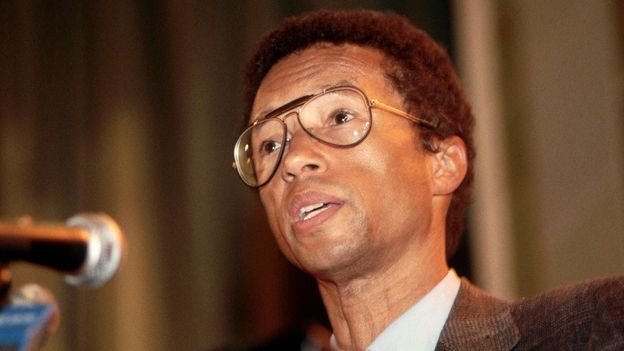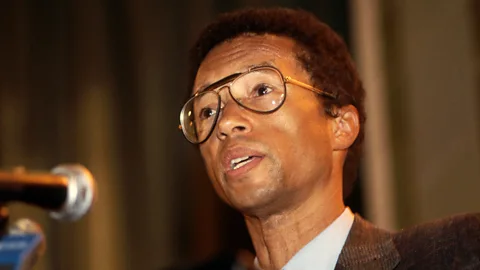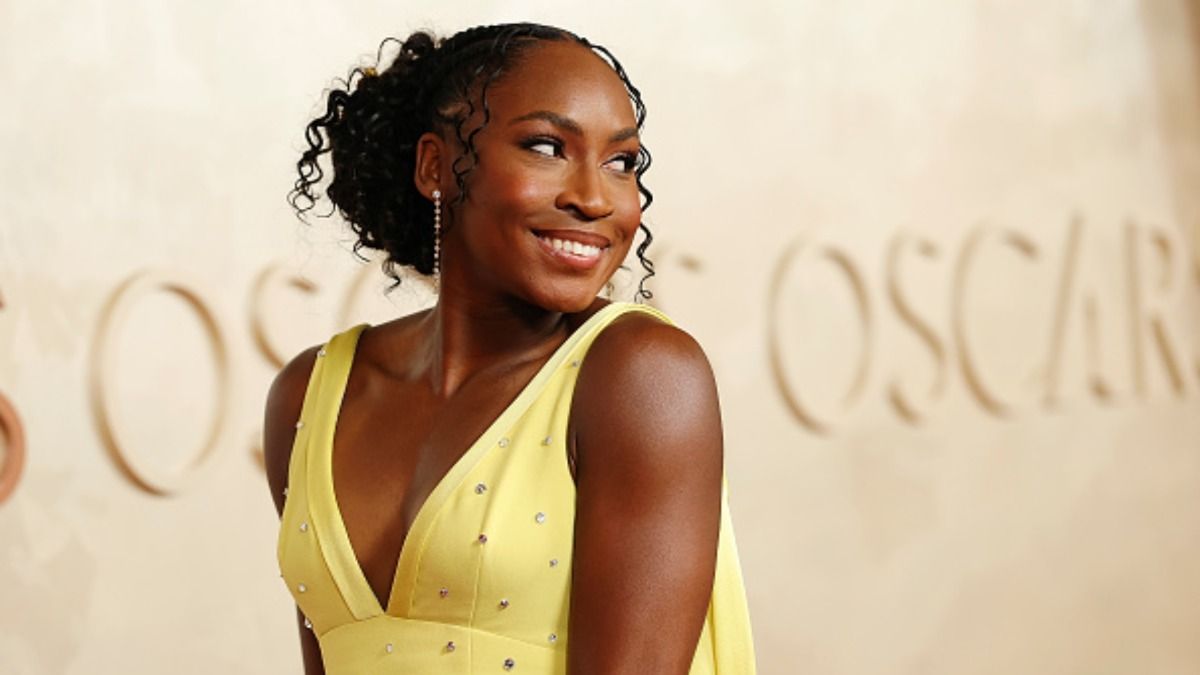‘I’m not afraid of dying’: The pioneering tennis champion who told the world he had Aids

 Getty Images
Getty ImagesIn 1988, World Aids Day began with the aim of raising awareness and understanding of a disease that had struck fear in communities around the globe. That same year, US tennis legend Arthur Ashe learned of his own diagnosis. In History looks at the dilemma that faced Ashe, when, after years of secrecy, he once again became a groundbreaking campaigner.
In April 1992, Arthur Ashe made his way into a packed conference room, where the media were poised with cameras rolling. This time he wasn’t being asked about his role as the first black tennis player to be selected for the United States Davis Cup team, or about his pioneering victories at Wimbledon, the US Open or the Australian Open. He had cemented his name in history as the first black winner of a major men’s singles championship, but after a heart attack that led to multiple surgeries, he had retired from the sport 12 years earlier, at the age of 36.
His intelligence, composure and sportsmanship had made him a popular figure, on and off the court. But the press had heard rumours about his health, at a time when the world was still full of fear of an incurable epidemic. USA Today sports journalist Doug Smith, a childhood friend, confronted Ashe about a tip-off he had received. The next day, keen to control his own story and beat the press, Ashe reluctantly told the world the secret that he and his inner circle had kept since 1988: he had Aids.
He believed that he had contracted the illness from a contaminated blood transfusion during surgery in 1983, two years before blood donations were screened for the HIV virus in the US. The devasting news shocked the nation, but it quickly led to a debate around personal privacy and the ethics of an invasive press. At the conference, Ashe read a statement: “I am angry that I was put… in the unenviable position of having to lie if I wanted to protect my privacy.” He added that “there was certainly no compelling medical or physical necessity to go public with my medical condition”. In his memoir, Days of Grace, Ashe wrote: “More than 700 letters reached USA Today on the issue of my right to privacy, and about 95% vehemently opposed the newspaper’s position.”
Some Aids activists criticised Ashe’s desire for secrecy around his health, as they wanted public figures to broaden discussion beyond the focus of the LGBT+ community. Some felt that he would have been the perfect spokesperson to raise awareness, particularly amongst heterosexuals and minority groups: one letter went as far as to say that Magic Johnson, the NBA player who revealed his HIV diagnosis just five months earlier, could have been saved had Ashe spoken up sooner.
When asked at the news conference why he didn’t go public in 1988, Ashe said: “The answer is simple. Any admission of HIV infection at that time would have seriously, permanently, and – my wife and I believed – unnecessarily infringed upon our family’s right to privacy.” When the subject turned to telling his five-year-old daughter Camera about having the disease, emotion overcame Ashe, and his wife Jeanne read on his behalf.
The parameters of privacy
USA Today sports editor Gene Policinski had no qualms about his decision to pursue the story. He told the BBC’s Tom Brook: “This is one of the great athletes of the 20th Century. His name is instantly recognisable about the world. He has an illness that will prove fatal and, by any definition I’ve run into in 25 years in the newspaper business, that is news.” When asked if he felt any guilt, he said: “No, I didn’t. That would somehow imply that I felt my decision was wrong. And I don’t.”
Three months after revealing to the world that he had Aids, Ashe was in London to commentate on Wimbledon for HBO. During his trip, he was interviewed by the actor Lynn Redgrave on the BBC programme Fighting Back. He said: “I definitely wanted to go public at some stage, when I was reasonably healthy, to give myself time to help the cause worldwide. But my health was so good, I wanted to continue to do what I was doing without being bothered by this… Just the prospect of going public, you have some fears and some inconveniences you know you’ll have to undergo.”
Ultimately, the issue of privacy loomed large, and as he had done many times before, Ashe asked questions of the status quo. At the National Press Club, he challenged journalists to examine their sensibilities, asking, “What are the parameters of personal privacy? What are they? Who sets them? And by whose authority are they issued? To me, or to any other American, what is sacrosanct and inviolable?”
This was far from the first public stance Ashe took on a wider social issue. While his sporting prowess helped him break barriers on the court for black athletes, he spent much of his time off the court campaigning for change. Born in Richmond, Virginia in 1943, he had retreated into the world of sports and books after his mother died when he was just six years old. “Control is very important to me,” he told Redgrave. “You grow up black in the American south in the late 1940s and the 1950s, you have no control. White segregationist laws tell you where to go to school, which bus you can ride on, where you can ride on the bus, which taxis to take, what you can say. Your life is proscribed.”
But Ashe was a reluctant activist at first, preferring to concentrate on tennis, despite calls for him to use his public position to further the civil rights movement. It led to some accusing him of being an “Uncle Tom”, or someone who is complicit in racial oppression. But after years of being controlled by a racist system, Ashe didn’t feel liberated by the 1960s civil rights. He told the BBC that he had “black ideologues trying to tell me what to do”, adding: “All the time, I am saying to myself, ‘Hey when do I get to decide what I want to do?’ So I’ve always been sort of fiercely protective, with anyone, of my wanting to do and to control my life as I saw fit.”
When asked about the public outburst by his fellow tennis star, John McEnroe, Ashe commented: “McEnroe had the emotional freedom to be a bad boy. I never had that emotional freedom. If I had been like that, I am convinced, the tennis world would have dug me out of it… because of my race.”
Ultimately, Ashe needed to do things his way, and he would go on to use his position as a world-class athlete to campaign for several causes. At the height of his career, he confronted the apartheid regime in South Africa over many years, and in 1973, he travelled to the South African Championships under the agreement that the tournament would be integrated. Away from the glare of the world’s media, he also went on to fund a tennis centre for black South Africans in Soweto.
Ashe felt similarly passionate about inclusive involvement in tennis closer to home. As a co-founder in 1969 of the National Junior Tennis League, his aim was to ensure that children of all backgrounds had access to tennis, and not just those with country-club memberships. And while he was at first tentative in his involvement, in time Ashe would go on to be one of the most powerful voices in the struggle for justice and equality in the US. In the documentary Citizen Ashe, civil rights leader and key figure in the 1968 Mexico Olympics black power protests, Dr Harry Edwards, said of the tennis star, “When you brushed away the gentility, the niceness, the intelligence, the calmness, his statement would be more militant than mine.”
After Ashe suffered multiple heart attacks, he joined the board of the American Heart Association. And after he revealed his Aids diagnosis, it was no surprise when a new campaign began. As well as making media appearances debunking myths about the disease, he established the Arthur Ashe Foundation for the Defeat of Aids. On World Aids Day in December 1992, he addressed the World Health Organisation.
Ashe died in February 1993 from Aids-related pneumonia, two years before a new class of antiretroviral drugs became available that would let people with the virus live long and healthy lives. He told Redgrave in 1992: “I’m not afraid of dying. There’s always hope and you must live your life as if there is, or there will be, some hope. Hope should not be a selfish hope. For me the hope is, maybe there’s no cure for Aids in time for me, but certainly for everybody else.”
For more stories and never-before-published radio scripts to your inbox, sign up to the In History newsletter, while The Essential List delivers a handpicked selection of features and insights twice a week.
Related
Danielle Collins prepares gift for Djokovic as she continues at…
Danielle Collins has vowed to gift Novak Djokovic some of her merchandise after the Serb offered his support to the WTA star. Collins hasn’t been afraid to sp
“Second-Guessing Herself”: Jessica Pegula Unpacks the Inspiring Comeback of Newlywed…
What a year this has been for American women’s tennis! We’ve seen plenty of title triumphs, but if asked to single out one big win among those, it’d surel
Coco Gauff rarely gets…”: American tennis legend weighs in on…
A former American tennis superstar has leaped to Coco Gauff’s defense after the 20-year-old phenom faced backlash for her recent Oscars appearance—a glamoro
Novak Djokovic over LeBron James and Cristiano Ronaldo? American tennis…
A former American tennis great has sparked a firestorm in sports debates by declaring Novak Djokovic the greatest athlete of the modern era—surpassing icons l











